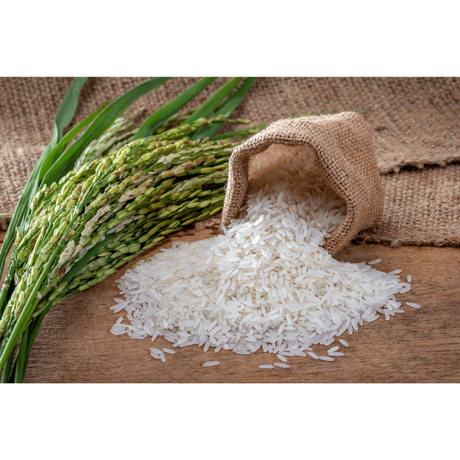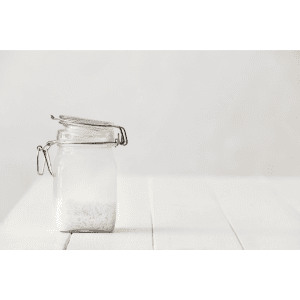
Rice Water for Skin: Benefits and Side Effects
Sitting inside many bathroom cabinets are half-used “miracle” serums that promised flawless skin but didn’t deliver. With skincare brands constantly churning out new products, it’s easy to get caught in the cycle of buying, trying, and sighing.
Interestingly, though, you may not need another dedicated skincare product to (hopefully) enhance your beauty routine. According to users on TikTok, the secret to your best skin yet may lie in something you likely throw out while cooking: rice water
If you’re into beauty hacks, you may have seen countless TikTok videos demonstrating how to use rice water on your skin and folks sharing their success stories. Supposedly, rice water offers beauty benefits many high-end skincare products try hard to replicate.
But is there any scientific evidence to support these purported benefits? In this article, we’ll delve deep into the science behind and origins of this DIY beauty hack and the possible benefits and side effects for your skin.

First and foremost, what is rice water?
Rice water is precisely what it sounds like: the starchy, milky-colored liquid that remains after cooking or soaking rice. You can make it by boiling rice until it dissolves into the water or soaking uncooked rice for some time and then straining it to separate the enriched liquid. Some people also ferment rice, meaning it sits longer to draw out more beneficial compounds.
While many of us typically throw out leftover rice water once we’re done, others incorporate it into their skincare routines. WebMD points out that rice water contains antioxidants and ultra-hydrating minerals that may help you achieve that coveted “glass” skin.
These key ingredients include:
- B vitamins
- vitamin E
- antioxidants, such as phenolic and flavonoid compounds
- minerals, including manganese, zinc, magnesium, calcium, potassium, and more
- amino acids like ferulic acid
- allantoin (a soothing agent for the skin)
Some research shows that fermented rice water also contains inositol, a sugar molecule that fights against free radical damage. Additionally, it includes the compound pitera, a byproduct of yeast fermentation.
Rice Water for Skin: What Supporters Are Claiming
Advocates for the rice water beauty trend (particularly on TikTok) claim rice water works wonders for your skin, keeping it soft, supple, and smooth. Many proclaim that rice water soothes, tones, and brightens the skin and reduces fine lines and wrinkles. Moreover, they believe that since rice water is made with only two simple ingredients (rice and water), it’s an easy and affordable do-it-yourself home treatment and doesn’t contain those unnatural chemicals found in many beauty products. Some also argue that rice water has made it into many commercial beauty products, so there’s little reason not to try it.
A Brief History of Rice Water in Skincare
There’s a lot of buzz these days about rice water and its beauty benefits. But long before reaching viral status, rice water was a centuries-old beauty staple rooted in Asian skincare traditions.
The Book of Rites, also known as the Liji, reveals that the Chinese women of the Tang Dynasty (618-907 AD) were among the first to embrace pan–water used to wash rice—as part of their beauty routine. They recognized its skin-nourishing effects and used rice water to cleanse and brighten their complexions. They even created beauty rituals that involved soaking rice in water to make the milky solution, which they then applied to their faces.
In ancient Japan, geishas and noblewomen used rice water, known as “Nuka Bijin,” to achieve clear, porcelain-like skin, explains Ancient Origins. The women made a rice paste by mixing rice bran with water. They then applied the paste to their faces and bodies. Rice water also became a skincare staple in ancient Korea, where Korean women used it to cleanse and hydrate their skin.
But you might wonder: how do we know that rice water isn’t just another passing social media fad? While there aren’t many high-quality studies on the effects of rice water, existing research suggests it could benefit the skin in various ways.
Benefits of Rice Water for the Skin
Previously, we explored the beauty benefits of using filtered water. Now, research shows another type of water worth adding to your skincare regime: rice water. Let’s look at the perks of using rice water on your skin.
It has anti-aging properties.
Research suggests that rice water can help combat the signs of aging. A 2018 study published in the journal Cosmetics found that rice water blocks the activity of elastase, an enzyme responsible for breaking down elastic fibers in the skin and leads to wrinkles as we age.
Rice water also contains ferulic acid, a powerful, plant-derived antioxidant compound WebMD says helps protect the skin from free radical damage and slows visible aging. Allantoin, another organic ingredient in rice water, can also work as a potent anti-aging ingredient by encouraging collagen production and stimulating fibroblasts. At the same time, inositol may smooth existing wrinkles, according to a 2001 study
The short of it is that these compounds help blur away premature signs of aging, such as fine lines and wrinkles, maintaining your skin’s youthful appearance for longer.
It can brighten and improve skin complexion.
If you’ve been dreaming of a smoother, clearer, and more even skin tone, rice water might make it a reality. “[Rice water] contains brightening ingredients like kojic acid, antioxidants like ferulic acid, as well as hydrating ingredients like allantoin,” says Teresa Song, MD, a board-certified dermatologist at Marmur Medical.
According to Healthline, kojic acid brightens skin by reducing the production of melanin, a pigment that gives skin, hair, and eyes a brown color. Medical News Today explains that ferulic acid, another antioxidant in rice water, may also inhibit melanin production to produce a similar skin-brightening effect.
When used regularly, rice water may also lighten dark areas of the skin to create a more natural, even tone. The melanin-inhibiting effects of kojic acid and ferulic acid may help with hyperpigmentation. This common condition causes areas of the skin to darken due to an excess of melanin.
It can soothe irritation and hydrate the skin.
You’ll notice how smooth and hydrated your skin feels weeks after applying rice water to your skin. This is likely a result of the high starch content in rice water. A study found that bathing in water containing rice starch for 15 minutes twice daily improved the skin’s healing capacity by 20%.
Rice water is also packed with ultra-hydrating vitamin B and vitamin E minerals that “add a bit of moisture to the skin,” explains board-certified dermatologist Mona Gohara, MD. Other vital skin-hydrating ingredients in rice water include allantoin, a compound dermatologist-founded skincare brand Prequel says moisturizes the skin and improves skin smoothness by “increasing water content in the skin, promoting topical skin rejuvenation, and encouraging the shedding of dead skin cells.”
It can help protect the skin against sunburn and free radical damage.
Rice water is an excellent skin protector, as it’s rich in powerful antioxidants like phenolic compounds, flavonoids, and inositol. These compounds strengthen the skin’s barrier and may help combat the damaging effects of free radicals from UV radiation.
Medical News Today explains that the antioxidants in rice water help reduce overall oxidative stress on the skin, protecting skin cells, tissues, and structures from oxidative damage over time. In a 2018 study of 12 participants, rice water gel was applied to each person’s skin over 28 days. The researchers found that the antioxidant activity from rice water rivaled that of ascorbic acid and vitamin C.

Side Effects of Rice Water for Skin
Unless you’re allergic to any ingredients in rice water, dermatologists say there aren’t many side effects to worry about after using it on your skin. If you do have a known rice water allergy, Dr. Blair Murphy-Rose, a board-certified dermatologist, advises that you avoid using rice water on your skin and explore alternative treatments instead. Those with eczema or similar conditions should speak with their doctor before trying it, warns WebMD
Additionally, if you’re considering using a commercial skincare product infused with rice water, other ingredients in the formulation may cause adverse reactions. Also, be aware of whether the water used to wash, soak, or ferment the rice is unfiltered. Untreated tap water may be tainted with toxic contaminants that may irritate your skin
As with any new skincare product, Dr. Murphy-Rose notes that it’s crucial for first-time rice water users to spot-test it. If you experience allergies or sensitivities, stop using it immediately and consult a dermatologist. Also, be careful not to overuse rice water; it can cause dry, flaky skin and rashes.
Elevate Your Rice Water Skincare Regime with SpringWell Filtration
If you plan on using the water from your tap to create rice water for your skin, you could seriously undermine your beauty efforts if the water is unfiltered
As mentioned above, unfiltered water may contain a barrage of toxic contaminants that can wreak havoc on your skin, especially if it’s sensitive or you have skin issues like eczema. By filtering your water, you remove unwanted elements like chlorine, pesticides, volatile organic contaminants (VOCs), arsenic, bacteria, and chromium-6. As a result, you’ll likely see better results after using rice water. Not only that, you won’t have to worry about ingesting dangerous chemicals in your cooked rice and other meals.
If you need protection from skin-harming contaminants at your kitchen tap and in the shower, our Whole-House Water Filtration System ensures that every drop of water entering your home is clean and safe. For targeted filtration, like at your kitchen faucet, the Moen Reverse Osmosis Water Filtration System provides ultra-pure water for making your rice water treatments, meals, and drinking water cleaner, healthier, and safer.

Final Thoughts
There is still much to be identified and tested but initial results of rice water benefits look to be positive. There is no magic formula to skincare or reversing aging, but staying hydrated and keeping your skin treated is always a good idea. Ensuring the water being mixed, boiled or combined with the rice being filtered and free from contaminants will only further the benefits and aid in the regime to help your skin.
